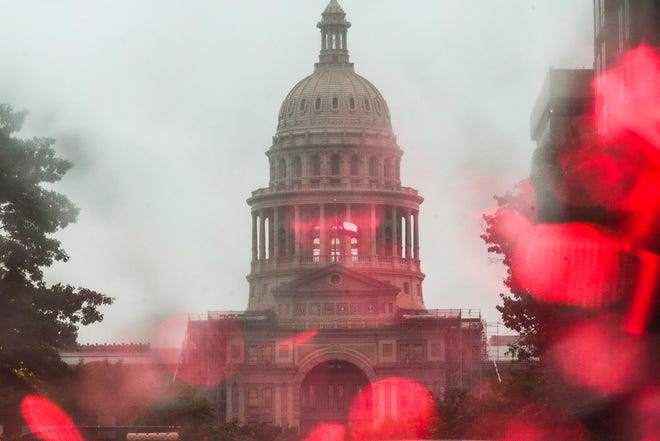

The Texas Senate has approved legislation that would restrict how local governments could fund lobbyists to help them influence proposed state laws and policies moving through the Legislature.
Senate Bill 175, which passed from the chamber on a 19-12 party line vote last Thursday, would ban cities, counties and school districts from spending public funds to hire registered lobbyists tasked with pressing lawmakers for political action.
The bill from freshman Sen. Mayes Middleton, R-Galveston, also prohibits political subdivisions from using public funds to pay nonprofit state associations or organizations, such as the Texas Municipal League, that contract registered lobbyists.
Middleton’s proposal has been a priority issue for the Texas GOP in previous sessions. He points to lobbyists possibly working against the best interests of those they are meant to represent, referencing past lobby opposition to certain tax proposals and against a school voucher program.
More:Texas Republicans are making their mark in Washington

“Elected officials are supposed to directly represent their communities whether at the state level or the local level,” Middleton said while laying out the bill on the Senate floor on April 6. “And better than an Austin lobbyist, every taxpayer has a state representative and a state senator to represent them in Austin.
“Senate Bill 175 encourages that direct communication between elected officials by removing the Austin lobbyist middleman.”
While there are several exemptions in the bill, opponents have argued the legislation creates different lobbying standards for different entities and takes away a tool local governments use to advocate on their behalf in the Capitol.
“Your layout, it’s almost as if they’re (lobbyists) always working against the best interest of the constituents, and I don’t see it that way,” Sen. José Menéndez, R-San Antonio, said in calling the bill flawed. “In essence, we’re muffling the voices of the duly elected mayors, city council members, school board trustees, because we think we know best.”
More:Texas House OKs $302 billion budget that bans state funding for school choice. Here’s why.

Sen. Sarah Eckhardt, D-Austin, who is a former Travis County judge, pointed to the vast spectrum of different county-level concerns, ranging from droughts in West Texas to flooding along the Gulf Coast, for which those governments need to address at the Capitol and lobbyists are a way to do that for 254 separate counties and many local officials who can’t be in the building or sacrifice staff to be in Austin. She also questioned Middleton over the ban’s potential effects on state agencies on employing federal lobbyists in Washington.
Currently, state law prohibits state agencies from using public funds “to attempt to influence the passage or defeat of a legislative measure” in Texas.
Meanwhile, the Texas Department of Transportation, through its Government Relations Division, employs lobbyists that are “responsible for TxDOT’s interaction with Congress, the United States Department of Transportation, and other national and federal agencies and organizations,” according to the agency.
When asked if the bill would impact TxDOT’s current federal lobbying contracts, Middleton said his proposal would not apply to those agreements.
“No, this is only a state level,” he said.
More:Rep. Ellen Troxclair wants to fix Austin’s problems. Others want her out of the way

Several senators took issue with what they called a double standard, including Sen. Nathan Johnson, D-Dallas, who listed a number of firms employed by the state to work on its behalf.
“So, as a point of clarity, Texas does this in Washington. Period,” Johnson said. “And yet we’re saying cities can’t do it in Texas.”
Under the bill, municipalities and counties would not be prohibited from “influencing or attempting to influence the outcome of legislation related to the military, military service members, or military veterans.”
Additionally, the legislation allows a county commissioners court to use general fund revenue to pay for membership in a nonprofit state association or organization, like the Texas Association of Counties, if that association exists “for the betterment of county government” and is not associated with a labor organization.
Previous language, struck from the final version of the Senate bill, which has now advanced to the House for consideration, would have prohibited those agreements between organizations and counties from lobbying for the passage or defeat of legislation.
In the House, a similar proposal from freshman Rep. Ellen Troxclair — an Austin-area Republican who has filed bills this session to place Austin Energy, the city’s utility provider, under state control and possibly end Project Connect, Austin’s voter-approved multibillion mass transit initiative — has been referred to the House Committee on State Affairs. House Bill 3538 is not yet scheduled for a committee hearing.
During the 87th Legislature in 2021, the Senate passed the similar “Stop Taxpayer-Funded Lobbying Act,” which the Texas Republican Party approved as a priority in 2020.
The bill in 2021 was a priority for Lt. Gov. Dan Patrick, a Houston Republican who presides over the Texas Senate, but it died in the House.






